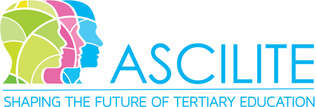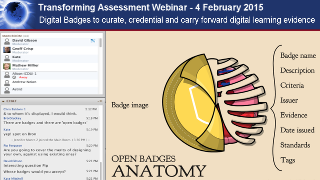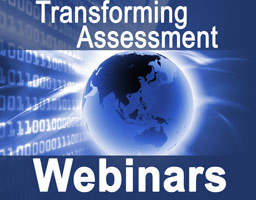4 February 2015: Digital Badges to curate, credential and carry forward digital learning evidence
Presenters: David Gibson (Curtin University, Australia) and Kate Coleman (Deakin University, Australia)
Hosted by Professor Geoffrey Crisp, RMIT University and Dr Mathew Hillier, University of Queensland, Australia starting 07:00AM UST/GMT. Duration 1 Hour.
This seminar explored the following questions: What is badging, and how can I use it to warrant learning and motivate higher education students? How do I implement a whole of program approach to badging - in a degree program or an extra-curricular program? How do I implement a whole of institution approach to badging- how to approach policy, change leadership, and professional bodies?
Mozilla's Open Badges project has opened up a new way of recognising skills and learning through an open, stackable framework and provided an opportunity to identify more detailed aspects of learning. Badging skills, experiences and knowledge can supplement or possibly replace traditional assessment signals such as marks and grades in the future. We have also seen through our networks and ongoing research how open badges can enable a more social approach to assessment: where badges can be issued or endorsed by designated stakeholders - peers, mentors, industry, associations – both within and outside of an institution and build the learner's ability to judge their own and others' performance.
In 2014, Deakin University, Melbourne Australia with project partner Curtin University, Perth Western Australia were awarded an Australian Office for Learning and Teaching strategic commissioned project to research, educate and advise Australian higher education providers - through networks, resources, courses and forums - to (1) design courses where students, including those without broadband connectivity, curate rich digital evidence and carry it forward; (2) micro-credential outcomes using digital badging; and (3) explore educational pathways and business models to enable lifelong learning for students. The project is supported by non-commercial international network enabling partners: two based in the USA - Humanities, Arts, Science, and Technology Alliance and Collaboratory (HASTAC), Association for Authentic, Experiential and Evidence-based Learning (AAEEBL) and the UK-based The Centre for Recording Achievement (CRA). This networking, support and collaborative partnership includes commercial digital enablers, Badge Alliance, Telstra, Cisco and a government cross-sector education agency: Education Services Australia.
Further information
- Slide Set: TA_webinar_4_feb_2015_slides.pdf [3.4MB]
- Session chat log: TA_webinar_4feb2015_chat_log.txt
- David Gibson's Curtin homepage: https://ctl.curtin.edu.au/global/dir_directors.cfm/David.C.Gibson
- Kate Coleman's website: http://about.me/kate.coleman
- Beverley Oliver's project website: http://assuringgraduatecapabilities.com
Links shared during the session
- Badge Alliance: why badges?.
- Github repo for open badges specification.
- Creating an open badge: Badge Baking.
- The Learning Resource Metadata Initiative (LRMI): lrmi.net.
- Credly, a commercial platform using an open badge framework: credly.com.
- Matrix of platforms for Issuing Open Badges: Google docs spreadsheet.
- Design Principles Documentation Project: dpdproject.info.
- TED talk: Dan Ariely 'what makes us feel good about our work' (Oct 2012).
- Badge Alliance Standard Working Group google groups discussion
- Etale blog article by Bernard Bull: 'you can now earn a masters degree in edtech through competency based digital badges'.
- Europortfolio Open Badges and ePortfolios Maturity Matrix: download PDF.
- Campus Policy Framework for Open Badges (Badge Alliance): google doc.
- Campus Policy Framework for Open Badges 2015 version (Badge Alliance): google doc.
- Open badges Australia and New Zealand Youtube channel
- Open badges Australia and New Zealand Events
- A course about 'Badges: New Currency for Professional Credentials': on coursesites.com.
Session Recording
Multiple formats are available.
You Tube version (Flash video) - recommended version.
A screen cast of the session.
Start playing via You Tube (note: this is a single file): http://youtu.be/AW1A224y97g (You can choose to view in standard definition or high definition and in full screen mode).
Blackboard Collaborate/Elluminate v12.5 archive version
This uses the classroom system itself to re-play a recording of the event. You are also able to jump forward, back and pause the recording.
- Click: https://au-sas.bbcollab.com/site/external/jwsdetect/playback.jnlp?psid=2015-02-03.2332.M.769585F2052D451155C5DC3EC699EA.vcr&sid=2009132
- Next:
in Firefox/Internet explorer you may be promoted to open with/run or save the file - choose open with/run.
in Chrome a prompt will appear in the status bar at the bottom of the window - choose 'keep', then click the file name. - The Blackboard collaborate player should begin launching via JAVA.
If you are having trouble accessing the classroom system please read the help page.











